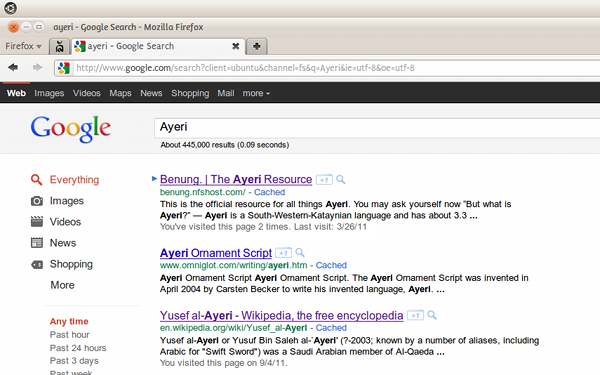This is another grammar musing on an issue I’ve been undecided about for quite some time now. If you look into the Grammar, you’ll find that ordinals and multiples are formed from cardinals like this:
men ‘one’ (one)
menan ‘first’ (one-NMLZ)
menanyam ‘once’ (one-NMLZ-DAT)
However, I came across situations where I wanted to say “at first” and “for the first time.” I wondered whether that could be covered as well by menanyam, literally ‘for first’, but somehow, I still wasn’t quite content, since doing something once isn’t always the same as doing it for the first time. Similarly, doing something at first is not necessarily doing it once or for the first time either. I came up with the following three alternate solutions for ‘at first’ some months ago:
?menya, lit. ‘at one’ (one-LOC)
menanya, lit. ‘at the first’ (one-NMLZ-LOC)
menanyam-ikan, lit. ‘very once/for the very first’ (one-NMLZ-DAT=very)
Now, through use, I somehow settled on menanya for ‘at first’ (English bias?), however, as of writing this, I think I could merge that with ‘for the first time’ and let context disambiguate: If there is a description of successive actions following, we know that the speaker probably means ‘at first’ (and then X, and then Y). Conversely, if context reveals that the action has never been done before, or that a person is new to something, we know that it is done ‘for the first time’. If there is no context, like in individual example sentences, things stay unclear, though I guess that this situation is kind of artificial, since sentences are rarely not embedded into context in real life, or even in texts.
If I didn’t want ambiguity, ?menanyam(an)ya could be possible, but I find that very unwieldy, as stacking case markers on top of each other is kind of avoided and renominalization with a case marker feels somewhat awkward, too, although I ran into situations where I wanted to do that with gerunds. Menanyam-ikan could be used as a very stern version of ‘once’, like ‘once and for all’.
Very much incongruent to this is ‘last’, which is now split between sarisa ‘former, previous'[1. This looks like it’s derived from sara- ‘to leave’ + -isa ‘CAU’, so ‘made to leave’ literally, or ‘be left’, since causatives are used somewhat irregularly in Ayeri. I don’t usually keep track of how words are derived, which is kind of stupid sometimes.] and pang-vā ‘back-most’. While sarisa is strictly used to mean ‘previous’, pang-vā[2. This appears to be somewhat in analogy to ban-vā ‘best’, although even that is strictly an irregularity …] can only be used to refer to the last item of a set.
